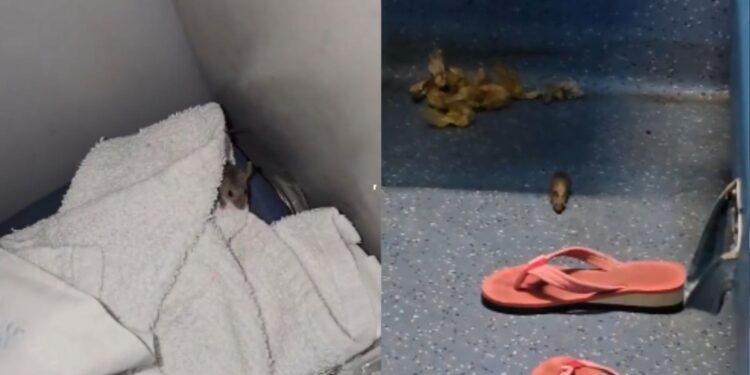Passenger Pays ₹2,000 for AC Ticket, Finds Rats Crawling in South Bihar Express Coach
A train passenger was left horrified after paying ₹2,000 for a second AC ticket on the South Bihar Express, only to encounter rats scurrying through the coach. The shocking incident, captured on video, has gone viral on social media, sparking widespread outrage and raising serious concerns about the cleanliness and hygiene standards on Indian Railways.
The passenger, who had boarded the train expecting a comfortable journey, was appalled to discover rodents moving freely inside the air-conditioned compartment. Fellow travelers also expressed their disgust, with many sharing footage of the infestation online. The videos quickly gained traction, drawing sharp criticism from netizens demanding accountability from railway authorities.
Indian Railways, one of the world’s largest rail networks, has faced criticism in the past for sanitation issues, but this incident has reignited public concern. Passengers argued that paying a premium for AC tickets should guarantee at least a basic level of cleanliness and pest control.
In response to the backlash, railway officials have stated that they are investigating the matter and have promised to take corrective action. They assured passengers that regular pest control measures are in place, but admitted that lapses sometimes occur. The authorities have vowed to intensify inspections and improve sanitation protocols to prevent such incidents in the future.
This distressing episode highlights the urgent need for more stringent cleanliness practices on Indian trains, especially in higher-class coaches where passengers pay significantly higher fares. Until substantial improvements are made, passenger confidence in train travel may continue to waver.
The incident serves as a stark reminder that comfort and safety must go hand in hand, and travelers deserve a hygienic environment for their journeys. Whether this viral outrage leads to lasting change remains to be seen, but it has undoubtedly placed railway cleanliness firmly in the spotlight.
Passengers traveling on long-distance routes often rely on the railways for convenience and affordability, but recurring incidents of poor maintenance have been eroding public trust. Many travelers have shared similar experiences online, with reports of cockroach infestations, dirty washrooms, and unclean bedding surfacing frequently.
The South Bihar Express incident is not an isolated case — it underscores a broader issue of inadequate upkeep in passenger coaches.
Experts believe that consistent underfunding and lack of rigorous quality checks contribute to these persistent problems.Passenger
To address passenger grievances, railway authorities have pledged to review vendor contracts for coach maintenance and assess the effectiveness of current pest control procedures. Additionally, they are considering launching a helpline for passengers to report unsanitary conditions in real time, enabling faster intervention.
Advocates for railway reform stress that sustainable improvements require not only increased funding but also better accountability mechanisms. They argue that regular third-party audits and passenger feedback systems could help bridge the gap between policy and on-the-ground execution.

As videos of the rat-infested coach continue to circulate, pressure is mounting on Indian Railways to act swiftly and transparently. The incident has prompted calls for an independent inquiry and more stringent penalties for negligence in sanitation management.
For millions of Indians who rely on trains as their primary mode of transport, a cleaner and safer rail experience is not just a luxury — it’s a necessity. The viral outrage may serve as a catalyst for change, but only time will tell whether this momentum leads to tangible reforms or fades into yet another forgotten controversy.
In the meantime, passengers remain wary, hoping that their next journey doesn’t come with unwelcome furry companions. For now, the South Bihar Express incident remains a powerful testament to the urgent need for better standards across the nation’s vast rail network.















 Categories
Categories










